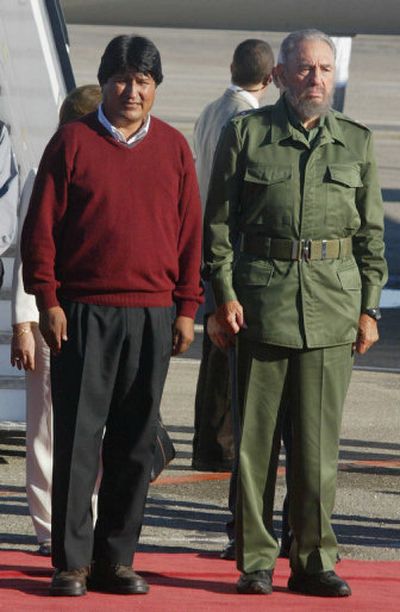Castro, Morales bond during Bolivian’s visit

HAVANA – Bolivia’s President-elect Evo Morales arrived in Cuba on Friday on his first overseas trip since winning a landslide victory that shifts the political tide in Latin America further leftward.
Greeted at the airport in Havana by Cuban President Fidel Castro, Morales expressed “joy” at being in Cuba and described his two-day visit here as a show of “friendship for the Cuban people.”
Castro called the Dec. 18 victory by Morales, a staunch U.S. opponent and Bolivia’s first indigenous president, “something extraordinary, something historic.”
“I think that it has moved the world,” Castro said, standing on the airport tarmac dressed in his familiar combat fatigues.
Morales’ trip to Cuba is unlikely to please the United States, which has expressed concern at the growing leftward tilt of many Latin American nations.
U.S. relations with Venezuela, a key source of imported oil, are at their worst in years as Venezuelan President Hugo Chavez opposes virtually every U.S. initiative in the region.
The Bush administration also has tightened sanctions against Cuba in what it describes as an effort to speed the transition to democracy. The measures have been largely neutralized by massive financial assistance to Cuba from Venezuela.
Morales, a 46-year-old Aymara Indian and former leader of Bolivian farmers who grow coca, the raw material for cocaine, has promised to end the U.S.-backed coca eradication program in Bolivia, even as he vows to continue fighting drug trafficking.
The president-elect also plans to nationalize Bolivia’s energy industry and redistribute land, while expressing admiration for Castro and pledging to fight U.S. imperialism.
Morales promised during the electoral campaign to be Washington’s “worst nightmare.”
Shortly after Morales’ victory, U.S. Secretary of State Condoleezza Rice told CNN that American policymakers would look at the new president’s actions before “determining the course of U.S.-Bolivian relations.”
“The issue for us is, will the new Bolivian government govern democratically?” Rice said Dec. 19. “Are they open to cooperation that, in economic terms, will undoubtedly help the Bolivian people, because Bolivia cannot be isolated from the international economy.”
Morales has visited Cuba on several occasions. But his decision to travel to Havana on his first trip abroad as president-elect is significant and indicates he is unlikely to seek quick accommodation with the United States.
“It’s a major political statement,” said Larry Birns, director of the Council on Hemispheric Affairs, a Washington-based policy group. “Morales at this point is not prepared to sacrifice his left-leaning profile in exchange for Washington’s approval.”
Morales, who will be inaugurated Jan. 22, won the presidency with nearly 54 percent of the vote, the most popular support of any president since democracy was restored to Bolivia two decades ago. But he will lead a nation long wracked by political instability and among the poorest in the Western Hemisphere.
Dressed in a maroon sweater and black slacks, Morales arrived in Cuba under bright sunshine and was immediately greeted by Castro. The two men stood at attention as a Cuban military band played the Cuban and Bolivian national anthems.
Morales is scheduled to return to Bolivia today to celebrate the New Year. He plans to visit Europe, China, South Africa and Brazil before taking office.